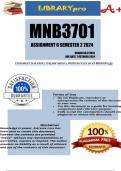MNB3701
ASSIGNMENT 6 SEMESTER 2 2024
UNIQUE NO.217042
DUE DATE: 7 OCTOBER 2024
, MNB3701
Assignment 6 Semester 2 2024
Unique Number: 217042
Due Date: 7 October 2024
Global Business Management IA
1. Executive Summary
The primary purpose of this report is to assess the performance and strategic
positioning of the multinational enterprise (MNE) under analysis, focusing on its ability to
navigate international markets. The key objectives include evaluating the institutional
frameworks, resource capabilities, challenges in trading internationally, foreign direct
investment (FDI) risks and opportunities, exchange rate management, and social
responsibility.
Major findings indicate that the MNE is well-positioned to leverage its unique resources
and capabilities, which are evaluated using the VIRO framework. However, challenges
such as exchange rate volatility and regulatory hurdles in international markets present
significant risks. The comparative advantage of the MNE, particularly in its access to
skilled labor and innovative technologies, gives it an edge, but these must be protected
against market fluctuations and competition.
Foreign direct investment (FDI) in African countries, though promising, comes with
certain risks, including political instability and fluctuating exchange rates. The MNE has
addressed these risks by diversifying investments and entering into regional economic
integration agreements, which align with global trade initiatives and boost its competitive
position.
The MNE’s Corporate Social Responsibility (CSR) initiatives further enhance its
reputation, particularly through contributions to local communities and environmental
sustainability efforts. Recommendations include developing stronger exchange rate
, hedging strategies and enhancing FDI risk assessments while expanding CSR to align
with local cultures.
The conclusion ties these aspects together, affirming that the MNE can achieve greater
international success through strategic resource management, responsive FDI
strategies, and ongoing participation in global economic integration.
2. Literature Search
This literature search builds on previous research by expanding the scope of scholarly
sources and integrating more contemporary studies on international business
management. Databases such as Google Scholar, JSTOR, and EBSCOhost were
utilized, with a search period covering studies from 2015 to 2024 to ensure relevance.
Key search terms included "foreign direct investment in Africa," "comparative advantage
in international trade," "exchange rate risk management," "corporate social responsibility
(CSR)," and "global economic integration." Over 20 scholarly sources were reviewed,
focusing on the intersection of international business strategy, institutional frameworks,
and CSR in multinational corporations.
The search evolved by incorporating more sector-specific research and case studies on
FDI in African countries, along with detailed studies on currency risk management. This
enhanced the analysis of exchange rates and integration into regional and global
economies, with specific focus on trade policies and multinational enterprise strategies.
3. Formal and Informal Institutional Frameworks
In revising the analysis of formal and informal institutional frameworks, this report
updates the sections on legal regulations, cultural norms, and business practices
affecting the MNE. Formal frameworks now reflect recent regulatory changes in the host
countries where the MNE operates, particularly in African markets. This includes
changes in trade regulations, tax incentives, and labor laws that impact the MNE’s
ability to expand or relocate operations.




